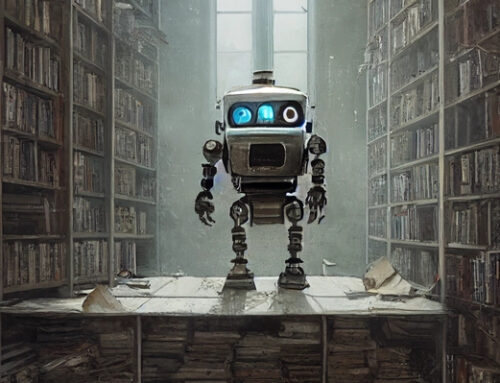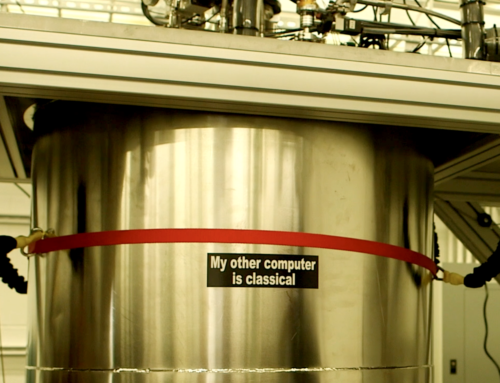Part II of III
Gabriella Skoff
Project Q seeks to perforate the silos built up around disciplines. We believe that the nature of science and technology is inherently social, and we strive to explore the ways in which these disciplines are cross-pollinated and how they intertwine. Likewise, the intersection of artificial intelligence (AI) and quantum physics, stemming from the disciplines of computer science and physics, respectively, demonstrates the value of building bridges between academically separated fields. This fusion presents benefits for both ends of the spectrum, promising to have an impact on the ways in which we understand and apply both quantum technology and artificial intelligence.
The emerging, interdisciplinary field of quantum machine learning is in a truly nascent stage of development. However, as demonstrated by the research cited in the introduction to this series, researchers are not waiting around for the full realization of a quantum advantage to begin testing these experimental waters. The results from early studies, using relatively low-powered quantum computers and machine learning systems, certainly lend support to the hype promising that together these technologies will make a big impact on our future. That being said, while these technologies are expected to affect a wide range of industries, there is no way to be sure of exactly how they will develop, both separately and in conjunction. The only surety is that there will undoubtedly be unexpected outcomes produced by the fusion of quantum and AI. Still, the big names in both quantum and AI development, including NASA, IBM and Microsoft, race ahead to develop these technologies for commercial and state-sponsored use.
Dual Promise
On a fundamental level, machine learning could contribute to the development of quantum computing itself. One emerging application for machine learning in quantum computing is in the formulation of complex quantum algorithms. This is a formidable challenge in quantum computing that could be confronted with the help of machine learning, in order for quantum algorithms to be designed and learned by quantum computers themselves rather than composed through the time-consuming effort of the few quantum experts. By using a physics-oriented approach to intelligent machines, complex, quantum-entangled experiments are already being designed by researchers working at the intersection of quantum and AI. Early examples of quantum experiments like this one, enabled by the power of machine learning, demonstrate the potential for AI to play a vital role in the development of quantum computing.
The promise of this application for machine learning in quantum computing is best summed up by Dr. Irfan Saddiqi, of Berkley’s Quantum Nanoscience Laboratory: “Can we teach a machine quantum mechanics? Can a machine learn the rules of quantum-mechanics? The answer is, absolutely.”. Saddiqi and his colleagues use recurrent neural networks (RNN), a specific type of AI algorithm that mimics the biology of the human brain to make sense of large data sets by identifying patterns from the data itself. While it should be noted that RNN cannot actually understand quantum computing in the way that a human brain can, it can produce computational results that can serve as a valuable tool for researchers. In this way, machine learning could be of important value to quantum computing by making sense of the vast amounts of data produced by quantum computers. Some predict that AI technology will eventually become a standard feature of quantum hardware for this reason.
Perhaps the most anticipated manifestation of the amalgamation of these technologies, however, comes in the form of a quantum boost to AI. Scientists are beginning to explore the question of how quantum computers could be used for intelligent data analysis. According to Canadian quantum computing company Xanadu, the potential areas of impact for quantum computing in AI include optimization, linear algebra, sampling and kernel evaluations. These four specializations of quantum computing could accelerate the development of AI to be more effective and efficient. Examples of use for these quantum capabilities in machine learning include, respectively: helping AI to evaluate hard-to-compute functions, exponentially speeding up the processing power of AI, producing data samples to train AI on, and augmenting certain functions of classical computers, such as the use of kernel methods, which can be difficult to compute classically. Today’s quantum computers are well-adapted to enhance these specific functions in AI, especially in cohesion with classical computers, as they are mostly special-purpose built devices at this stage in development.
Toward a More Objective AI?
As previously discussed, new research into the feature mapping capabilities that quantum computing could perform should enhance the sophistication of data mapping that AI is capable of. This illustrates the potential for AI powered by quantum computing to surpass its current levels of efficacy, by identifying patterns in data that are not visible to classical computers. According to IBM researchers: “AI systems thrive when the machine learning algorithms used to train them are given massive amounts of data to ingest, classify and analyze. The more precisely that data can be classified according to specific characteristics, or features, the better the AI will perform.”. A critical role that quantum computers could play in AI as their quantum volume increases, is to enable the computation of far more complex and vastly larger data sets through feature mapping. In less technical and more theoretical terms, perhaps this quantum capability will be able to influence more objective and less biased AI output, depending on the breadth and quality of data it is trained on.
The wisdom of the crowd theory, popularised in the Information Age by citizen-powered journalism sites such as Wikipedia or Reddit, underpins these website’s success in producing surprisingly accurate and up-to-date information, given that most contributors are not “experts”. As with machine learning, these websites are only as good as their data points in quality and in numbers. The wisdom of the crowd theory dictates that the larger and more diverse the pool of contributors producing information for any given article, the higher the levels of accuracy tend to be.
Quantum computing could offer machine learning a similar advantage by enabling a higher level of computational power to deal with a larger and more diverse sample of data points. It would be able to lend this advantage because the quantum properties of particles theoretically exist in a near infinite quantum state of all possible realities. The power of quantum computing lies in its ability to inhabit this quantum space, opening up the possibility for a far greater scale of computing than conventional computers can offer. With regard to machine learning, this means that patterns and features that AI algorithms look for in a data set could be sorted at a much faster pace with more efficiency than currently possible. While this theory has not been tested, perhaps quantum computing could help with AI’s ever-present bias problem, by enabling machine learning to process and identify patterns in larger and more complex data sets. Further, there is hope that this quantum-endowed capability, if realized, could allow for a more nuanced reading of data and lead AI systems to new findings.
Impacts in the Medical Sector
One domain where the ability of AI to pick up on subtler patterns from larger data sets, thanks to a quantum boost, could have an especially positive impact is in the medical field. There is significant hope amongst scientists that quantum computing and AI systems will revolutionize the medical sector through drug discovery, disease screening and by supporting clinical diagnosis and decision-making.
A controversial topic of discussion, it has now been shown that AI can make more accurate medical diagnoses and predictions than some doctors. While some may fear that this information will eventually lead to AI replacing doctor’s jobs, the far more likely outcome is that AI could function in support of them. In fact, AI is well-suited for the role of diagnosing, a task that involves scouring information for patterns and drawing conclusions from these.
Already, computer systems play a distinct role in this practice. Diagnosing systems, known as clinical support systems (CDSSs), analyse medical data to assist in clinical decision-making. AI systems powered by quantum computing could greatly enhance the efficacy and speed of such systems, providing vital support to physicians in diagnostics and leading to better health outcomes for patients.
Quantum-powered AI could also play a significant role in drug discovery. Currently, it takes on average 12 years and $2.7 billion USD to get a new drug to market. This is an issue currently being tackled by start-ups like GTN, a company that is working to combine the power of quantum computing and AI in order to cut those numbers in half. Co-founder and CEO of GTN, Noor Shaker, has vowed to solve this problem by combining the forces of these two technologies in order to improve access to new drugs, especially in developing countries.
In the case of GTN’s technology, quantum computers, which are able to conquer the complexity of chemistry problems, produce simulations of chemical interactions and feed that information into a machine learning algorithm. The algorithm can then analyse the data and search for patterns that will lead to an understanding of the compounds. According to a feature by MIT Technology Review: “Thanks to the combination of both technologies, the GTN LTD software detects new molecules that have the potential to behave like current drugs. The company’s algorithms simulate, filter and select molecules that were virtually invisible to convert them into different medications”.
Examples like this one demonstrate how the novel use of these two technologies could revolutionize the pharmaceutical industry, making the drug discovery process more efficient, quicker and cheaper. The knock-on effects of producing applications like this for quantum-AI technologies could have a significant impact on improving access to drugs and getting better drugs on the market faster, making life better for those living both in developed and in developing countries.
Impacts for Weather Modelling
The quantum-AI revolution is also set to make waves in precision weather-prediction capabilities. Accurate prediction of weather forecasting impacts a huge number of sectors across the globe. From business to agriculture to government, the ability to accurately predict changing weather patterns is of critical importance to society. Currently, the quality of weather forecasting is highly variable, dependant on the ability to collect and make sense of the mass amount of data produced by satellites. With the support of future quantum computers, AI systems could better analyse meteorological data in order to make clearer and more reliable weather predictions. This could lead to higher levels of disaster preparedness, especially in the case of more precariously-located developing countries, and this proliferation of more accurate information could help to improve more sustainable farming practices.
A far more insurmountable challenge in weather forecasting manifests in the long-term. Even on a very small scale, about 90% of five-day forecasts are accurate, compared to the approximately 50% accuracy rate for ten-day forecasts. Looking even further into the future, accurate weather forecasting is more or less impossible. Quantum and AI, however, could present a solution to this problem. By improving our ability to produce and make sense of vast amounts of data, quantum and AI systems could have a huge impact on our ability to create weather-forecast models far into the future. As we have previously covered, the improved ability to create accurate, long-term weather modelling could have a serious impact on our ability to verify the discourse on global warming, potentially prompting society to take action against climate change at a scale far more radical and quicker than what we are currently motivated to do. For many, something as intangible as climate change is only real once seen—perhaps the collision of quantum and AI in this space could endow us with that critical foresight before it is too late.
Impacts in the Financial Sector
In the banking sector, fraud detection techniques are already algorithmic. Classical computers, however, are slow at this task and require an abundance of power in order to perform the complex mathematics needed to detect fraud. Machine learning, driven by imminently more powerful quantum computing, could pick up on patterns and spot fraudulent activity with far greater ease and efficacy than what is currently possible using classical computing. Likewise, quantum algorithms based on AI systems are set to transform current trading practices through their joint optimization capacities. Quantum-powered AI systems could potentially play a strong role in identifying trading opportunities algorithmically, without the need for human input.
Of course, any time that the need for human input is lost, panic will rise. The fear the AI technologies will cause mass job loss across a number of sectors should not be ignored, but it should not incite panic either. Understanding the duality of the potential powers and threats posed by the fusion of quantum-AI could enable proactive policy, should governments invest the effort into understanding the social impact that these emerging technologies are sure to have.
Join us next week, as we take a deeper look into the nuances of these promises and explore the ways in which improper harnessing of these technologies could produce negative effects in our world.







[…] There are number of young companies emerging in the pharmaceutical research space, looking at the computational boost and projected accuracy that quantum computing could lend to a range of challenges in diagnostics, personalised medicine and treatments. As quantum computers are not yet advanced enough to stand alone, most of these global start-ups rely on a blend of emerging and classical technologies. Especially prominent is the blended technological approach in machine learning and quantum computing, a topic we have previously explored here. […]
[…] is expected to lend an essential boost to AI and could be used for more effective training in deep learning […]